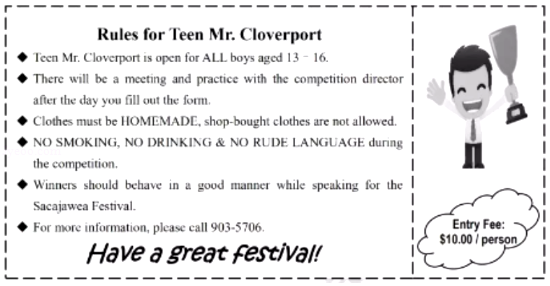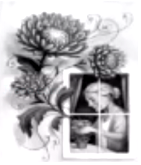It was our school's yearly dancing show. I(1) (be) excited that I was chosen by the teacher this time although I didn't have any experience of dancing for a show. I would dance in front of all the students and (2) (teacher). It made me very proud.
However, I was a bit sad (3) my father had no time to watch me dance. He(4) (invite) to have a business meeting. I knew that my father would surely come to my show if he could. (5) (lucky), my mother and my elder sister were still coming to watch my show.
(6) the beginning of the day, I was very nervous. After changing into the dress and getting my makeup done, I felt (7) (relax). Then I went on to the stage bravely. I was very glad to see my mother and sister sitting in (8) second row.
Just before the lights turned dark, I saw my father rush into the hall and take the seat beside my mother. (9) a pleasant surprise it was! The sight of my father made (10) (I) smile. I began dancing confidently. Soon after the show, my family came backstage to congratulate me. I was so happy and lucky to have my family's support.
Many people go to Utah because they love hiking in Bryce Canyon National Park. They enjoy (1) (岩石) climbing, camping and so on. However, some people go to Utah for a very (2) (不同的) experience.
The Boulder Outdoor Survival(生存) School(BOSS) in Utah is the world's oldest survival school. It teaches people how to stay alive without tents, or even backpacks. In Bryce Canyon, the days are very (3) (热的) and the nights are very cold. Not everyone wants to go and experience life without modern (4) (发明) like smart phones and e﹣books. Students at BOSS quickly learn that it is important to work hard and (5) (尝试) new things if they want to complete the training.
In survival camps at Boss students don' just practise camping, hiking or (6) (骑) horses. They go into the wild for days or weeks. They learn how to find (7) (新鲜的)water for drinking. They also learn how to make a fire, use a (8) (小刀) and find food to eat. Nature can often give them(9) (每件事) they need to survive.
After these people go back to the real world, they may never use these skills again. Even if they don't, at (10) (至少) they will always know that they can live without computers, electricity, and smart phones﹣even if it is only for a few days!
假如你在友好学校Cloverport School夏令营期间观摩了当地小镇的一个节日活动,请根据其中的一项活动宣传单,完成一则英文报告.每空限填一词.

Hello, everybody! I'm so glad to experience the Sacajawea (1) in the town of Cloverport. It's a community festival to bring people together. Teen Mr. Cloverport is a competition for (2) from thirteen to sixteen years old. My new friend Tristan paid (3) dollars to enter it. He was really excited about it. They have to wear homemade clothes instead of those bought from a (4) . I think the spirit of DIY really matters. To follow the rules, they are not (5) to smoke, drink wine, or speak rudely. They should be well﹣behaved. Thank you!
Last October, I told my pupils in Pompton School about my plan. " I'd like you to do jobs to make some (1) ," I said. Then we'll buy food for someone in need.
I wanted them to experience that it's (2) to give than to receive. I hoped they could experience a sense of their own ability to make a change.
Early in Thanksgiving week, the children couldn't wait to(3) . Before paying for the turkey and other food we chose in the supermarket, Kristine cried.
"Flowers!" And the group all ran toward the holiday (4) .
"You can’t eat flowers!" I said (5) . After all, it was helpful to buy more food.
"But Mrs. Sherlock," came the loud (6) , "we want flowers."
In the middle of the plants, there was a pot of unusually purple mums. "(7) will like this one." the children agreed.
(8) the address of a poor grandmother who had lived alone for years, we set off. An hour later, we stopped in front of a small house. A thin woman with a (9) face came to meet us.
As the kids carried all the food in, the old woman oohed and aahed﹣much to her visitors' pleasure. When Amy put the mums on the table, the woman seemed (10) . "She's wishing it was a bag of food" I thought.
"(11) is your close friend in the woods? "Michael asked.
The woman brightened. "The birds. They often fly over for food (12) I share my bread with them," she said.
Then we returned to the car. Through the window we saw her walk past the turkey, straight to the (13) . She put her face in them and looked up with a big smile. She was (14) before our eyes.
In that one short moment, the children had seen for themselves the(15) they owned to make a change. Sometimes a person needed a pot of nice purple flowers on a dark November day.
|
(1)A. friends |
B. mistakes |
C. money |
D. room |
|
(2)A. cheaper |
B. better |
C. safer |
D. funnier |
|
(3)A. take a walk |
B. do housework |
C. have a rest |
D. go shopping |
|
(4)A. cards |
B. camps |
C. plants |
D. photos |
|
(5)A. unhappily |
B. warmly |
C. carelessly |
D. freely |
|
(6)A. voice |
B. music |
C. sound |
D. noise |
|
(7)A. He |
B. I |
C. You |
D. She |
|
(8)A. At |
B. With |
C. In |
D. After |
|
(9)A. proud |
B. fat |
C. sad |
D. handsome |
|
(10)A. relaxed |
B. bored |
C. worried |
D. surprised |
|
(11)A. Who |
B. How |
C. Why |
D. Where |
|
(12)A. although |
B. but |
C. because |
D. if |
|
(13)A. books |
B. flowers |
C. woods |
D. rooms |
|
(14)A. changed |
B. broken |
C. treated |
D. refused |
|
(15)A. habit |
B. ability |
C. interest |
D. courage |

It takes me 45 m to get to school by bike every morning.